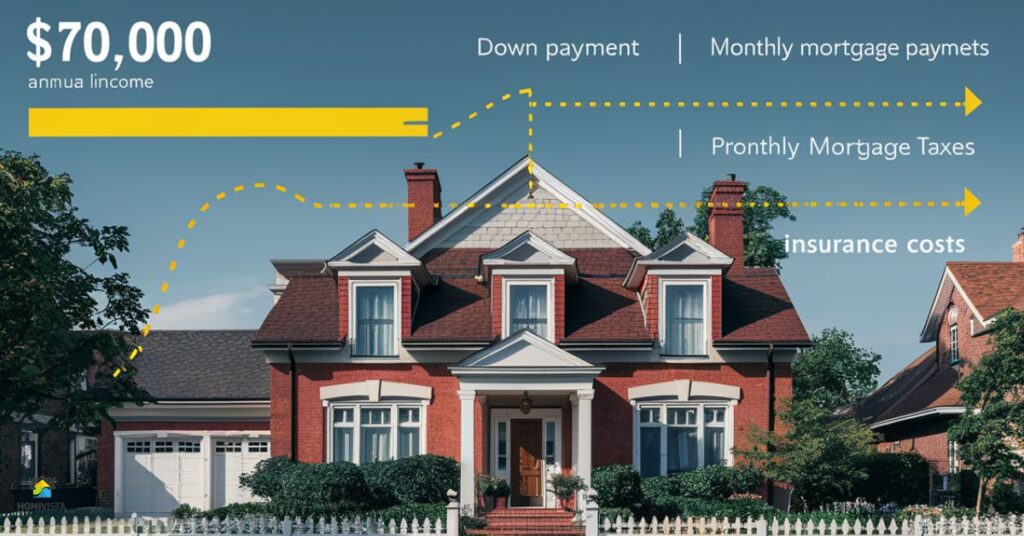If you make $70,000 a year, determining how much house you can afford involves several factors. First, consider your monthly expenses like bills, groceries and transportation. Experts often suggest spending no more than 28-30% of your gross income on housing costs, including mortgage, insurance and property taxes. Also, factor in your credit score, down payment and other debts for an accurate estimation.
Maximum home purchase price by down payment
Your down payment influences the maximum home purchase price you can afford. Typically, a larger down payment allows for a higher-priced home. For instance, a 20% down payment on a $300,000 home would require $60,000 upfront, while a 10% down payment would need $30,000.
Lenders often prefer larger down payments as they reduce risk and may offer better loan terms, impacting your purchasing power and overall affordability.
Maximum home purchase price by debt-to-income ratio
Your debt-to-income (DTI) ratio affects the maximum home purchase price you can qualify for. Lenders consider this ratio crucial as it reflects your ability to manage monthly payments. Typically, a lower DTI ratio indicates better financial health and allows for a higher-priced home.
For instance, a DTI ratio under 36% is often preferred by lenders, meaning your total monthly debt payments should be less than 36% of your gross income for optimal affordability.
Maximum home purchase price by mortgage rate
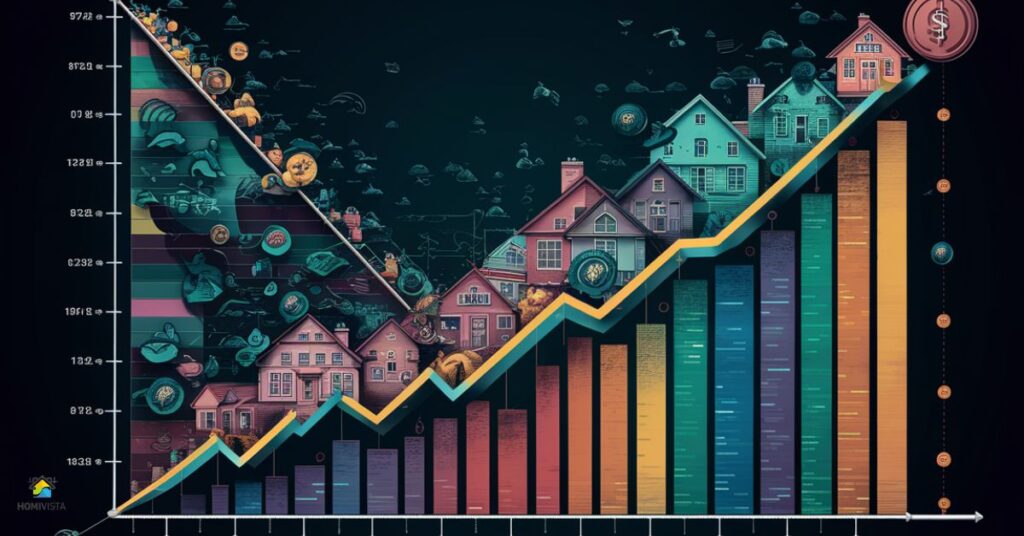
As mortgage rates increase, affordability decreases due to higher interest costs and monthly payments. Lower rates offer more purchasing power and lower monthly expenses, while higher rates reduce affordability and increase overall borrowing costs.
| Mortgage Rate | Maximum Home Purchase Price |
| 3% | Higher affordability, lower monthly payments |
| 4% | Moderate affordability, balanced payments |
| 5% | Lower affordability, higher monthly payments |
| 6% | Reduced affordability, higher interest costs |
| 7% | Limited affordability, significant interest expenses |
Read this blog: How To Get Around Netflix Household
Budgeting for monthly housing costs
Budgeting for monthly housing costs involves considering various expenses such as mortgage or rent, property taxes, insurance, utilities, maintenance, HOA fees and miscellaneous costs. Allocating funds for each category helps ensure financial stability and readiness for homeownership or renting.
| Expense Category | Estimated Monthly Cost |
| Mortgage/Rent | Main housing payment |
| Property Taxes | Tax assessment on property value |
| Homeowners Insurance | Insurance coverage for property |
| Utilities | Electricity, water, gas, internet |
| Maintenance | Repairs and upkeep expenses |
| HOA Fees | Homeowners Association fees, if applicable |
| Miscellaneous | Additional costs like landscaping, pest control |
How to calculate how much house you can afford
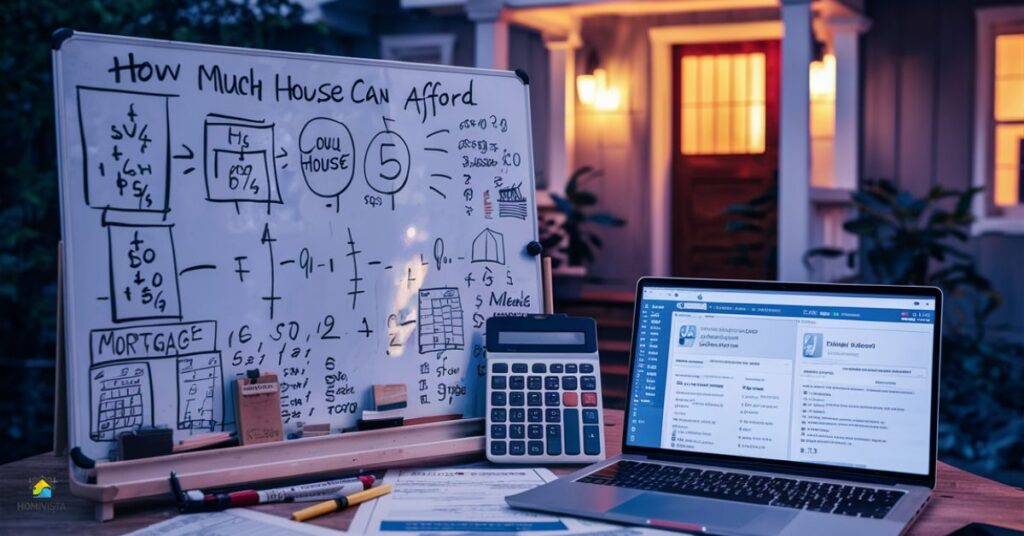
To calculate how much house you can afford, use this formula:
(Gross Income * DTI) – (Monthly Debt Payments) = Maximum Monthly Mortgage Payment.
Then use a mortgage calculator with the desired interest rate, down payment, mortgage term, property taxes and insurance to determine your affordable home price.Top of Form
| Factor | Calculation Formula |
| Gross Income | Annual salary before taxes |
| Debt-to-Income Ratio (DTI) | Total monthly debt payments / Gross monthly income |
| Down Payment | Percentage of home price paid upfront |
| Interest Rate | Rate charged by lender on mortgage |
| Mortgage Term | Length of time to repay loan |
| Property Taxes & Insurance | Estimated annual costs divided by 12 |
Consider your total monthly payment

Consider your total monthly payment using this formula:
Mortgage Payment + Property Taxes + Homeowners Insurance + PMI + HOA Fees + Utilities + Maintenance = Total Monthly Housing Payment.
This comprehensive approach ensures you budget for all essential expenses related to homeownership.
| Component | Calculation Formula |
| Mortgage Payment | Principal + Interest |
| Property Taxes | Annual Tax Amount / 12 months |
| Homeowners Insurance | Annual Premium / 12 months |
| Private Mortgage Insurance (PMI) | PMI rate * Loan Amount / 12 months |
| HOA Fees | Monthly Homeowners Association fees |
| Utilities | Estimated monthly utility costs |
| Maintenance | Average monthly maintenance expenses |
How your monthly payment affects your price range
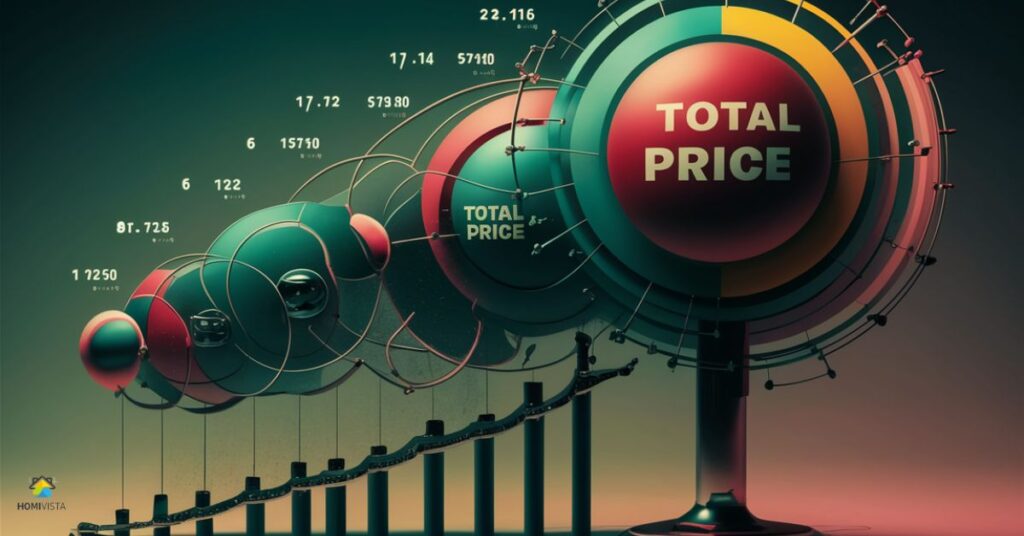
Monthly Payment Impact
Higher monthly payment = Affords higher-priced homes.
Lower monthly payment = Limits price range.
Calculation Formula
Monthly Payment = Principal + Interest + Taxes + Insurance + PMI + HOA + Utilities + Maintenance.
Affordability = (Monthly Income * DTI) – Monthly Debts.
Summary
Manageable monthly payments expand purchasing power.
Careful budgeting ensures housing costs align with financial capacity.
Factors that affect home affordability
Following factors affects the price of house:
Income Level: Higher income allows for more expensive homes.
Debt-to-Income Ratio (DTI): Lower DTI improves affordability.
Down Payment: Larger down payment increases buying power.
Credit Score: Higher score leads to better loan terms and rates.
Interest Rates: Lower rates mean lower monthly payments.
Property Taxes: Higher taxes reduce affordability.
Homeowners Insurance: Premiums affect overall housing costs.
Maintenance Costs: Higher upkeep expenses impact affordability.
Market Conditions: Supply and demand influence home prices.
Location: Desirable areas often have higher housing costs.
Down payment
The down payment is a crucial factor in home buying, impacting your loan amount and monthly payments. Here’s how it works:
Calculation Formula
Down Payment = Percentage of Home Price * Home Price
Loan Amount = Home Price – Down Payment
Advantages
Larger down payments result in lower loan amounts.
Reduced loan amount can lead to lower monthly payments.
Disadvantages
Requiring a substantial upfront sum can be challenging for some buyers.
Smaller down payments may lead to higher interest rates or additional fees.
Considerations
Optimal down payment percentages vary but commonly range from 10% to 20%.
Some loan programs offer lower down payment options but may require mortgage insurance.
Credit score
Your credit score plays a crucial role in determining your eligibility for a mortgage and the terms you’ll receive. Here’s a breakdown:
Calculation Formula
Credit scores are typically calculated based on payment history, credit utilization, length of credit history, new credit accounts and credit mix.
FICO scores, a common credit scoring model, range from 300 to 850, with higher scores indicating better creditworthiness.
Impact on Mortgage
Higher credit scores often lead to lower interest rates and more favorable loan terms.
Lower credit scores may result in higher interest rates or difficulty qualifying for loans.
Improving Credit Score
Pay bills on time, keep credit card balances low and avoid opening new credit accounts unnecessarily.
Regularly review your credit report for accuracy and dispute any errors promptly.
Considerations
Lenders have varying credit score requirements, but a score of 620 or higher is typically considered good for securing a mortgage.
FHA loans may accept lower credit scores, but borrowers may face higher interest rates or additional fees.
Mortgage interest rates
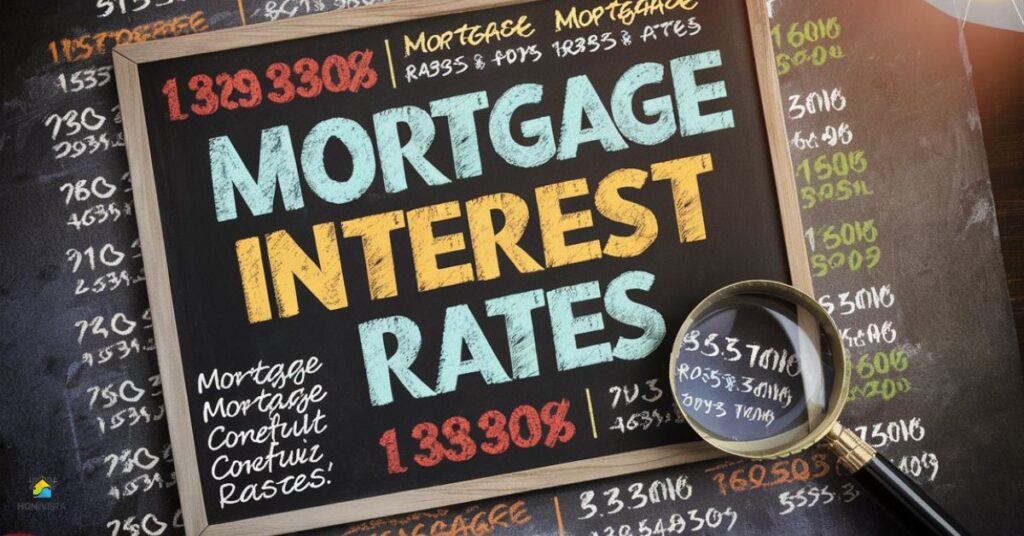
Mortgage interest rates significantly impact the cost of borrowing for a home. Here’s a detailed look at how they work:
Calculation Formula
Mortgage Interest = Principal Amount * Annual Interest Rate * Time (in years)
Monthly Mortgage Payment = (Principal + Interest) / Number of Months
Impact on Affordability
Lower interest rates result in lower monthly mortgage payments and overall borrowing costs.
Higher interest rates lead to higher monthly payments and increased long-term expenses.
Economic Factors
Interest rates are influenced by economic conditions, including inflation rates, government policies and market demand.
Locking in Rates
Borrowers can lock in interest rates during the loan application process to secure favorable terms.
Rate locks typically have expiration periods, so borrowers should finalize their loan before the lock expires.
Considerations
Compare rates from multiple lenders to find the most competitive offer.
Factors such as credit score, down payment, loan term and loan type can affect the interest rate offered by lenders.
Debt-to-income ratio
Your debt-to-income (DTI) ratio is key metric lenders use to assess your ability to manage monthly payments. Here’s an overview of how it works:
Calculation Formula
DTI Ratio = Total Monthly Debt Payments / Gross Monthly Income
Impact on Mortgage Approval
Lenders prefer lower DTI ratios, typically below 36%.
A lower DTI ratio indicates better financial health and may lead to more favorable loan terms.
Types of DTI Ratios
Front-end DTI includes housing-related expenses like mortgage, insurance and taxes.
Back-end DTI includes all monthly debts, including housing expenses, credit card payments and loans.
Managing DTI Ratio
Paying off debts or increasing income can lower your DTI ratio.
Avoid taking on new debts close to applying for a mortgage to maintain a healthy DTI ratio.
Considerations
Different loan programs may have varying DTI ratio requirements, so it’s essential to check with lenders for specific guidelines.
DTI ratios provide a snapshot of your financial capacity and play a significant role in mortgage approval decisions.
Employment history

Employment history plays a vital role in affording a house. Here’s how it factors in:
Income Stability
Lenders prefer borrowers with steady employment history as it indicates a stable income source.
Consistent income stream improves the ability to afford monthly mortgage payments.
Calculation of Affordability
Monthly Gross Income – Monthly Debt Payments = Maximum Affordable Mortgage Payment.
Employment history influences income stability, affecting the maximum mortgage payment you can afford.
Job Stability
Longer employment tenures or a history of job stability can strengthen your financial profile.
Frequent job changes or gaps in employment may raise concerns for lenders.
Career Progression
Advancements in your career, such as promotions or salary increases, can positively impact affordability.
Demonstrating upward mobility and earning potential enhances your ability to afford a house.
Considerations
Maintain a consistent employment history and avoid significant changes before applying for a mortgage.
Provide documentation, such as pay stubs and tax returns, to verify income stability and affordability.
Loan term
The loan term is a crucial factor in affording a house and affects your monthly payments and overall cost. Here’s how it works:
Calculation Formula
Monthly Payment = (Principal + Interest) / Number of Payments
Total Cost of Loan = Monthly Payment * Number of Payments
Impact on Monthly Payments
Shorter loan terms result in higher monthly payments but lower total interest costs.
Longer loan terms lead to lower monthly payments but higher overall interest expenses.
Affordability Considerations
Choose a loan term that aligns with your financial goals and budget.
Consider your income stability and future financial plans when selecting a loan term.
Total Cost Analysis
Compare the total cost of the loan over different terms to determine the most affordable option.
Balance monthly affordability with long-term financial savings when deciding on a loan term.
Factors Influencing Loan Term
Lenders may offer various loan term options, such as 15-year, 20-year, or 30-year terms.
Your creditworthiness, income and down payment can also impact the loan term and interest rates offered by lenders.
Tips to afford more house on a $70,000 salary
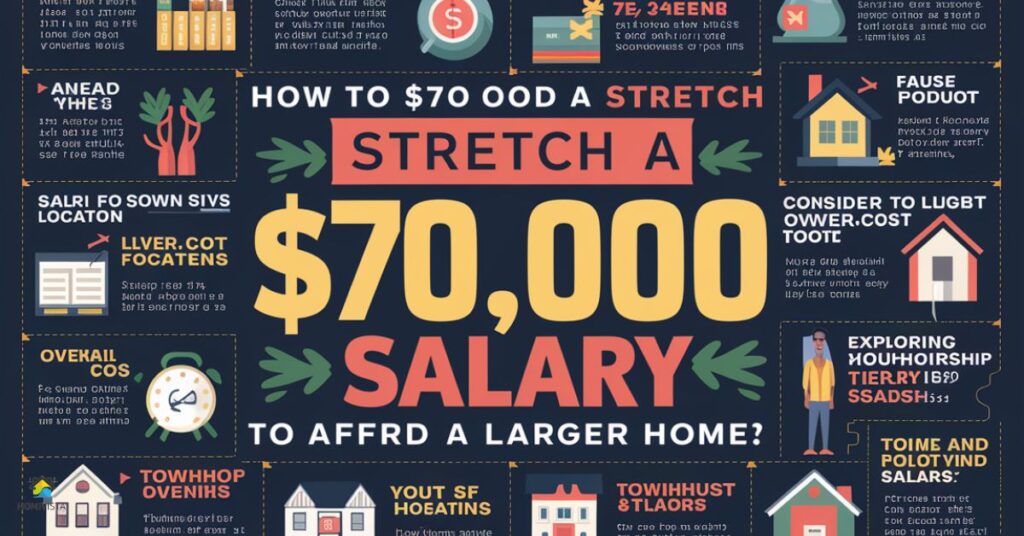
Affording more house on a $70,000 salary requires smart financial planning and decision-making. Here are some tips to help you achieve that:
Increase Down Payment: Save up for a larger down payment to reduce the loan amount and potentially qualify for a higher-priced home.
Improve Credit Score: Maintain a good credit score to access better mortgage rates and terms, which can increase your purchasing power.
Reduce Debt: Pay down existing debts to lower your debt-to-income ratio and improve your affordability for a larger mortgage.
Explore Loan Options: Research different loan programs and lenders to find the most favorable terms and rates that fit your budget.
Consider Affordable Locations: Look for homes in areas with lower housing costs or consider commuting from more affordable neighborhoods.
Budget Wisely: Track your expenses, prioritize savings and cut unnecessary costs to free up funds for a larger housing budget.
Increase Income: Explore opportunities for career advancement, side hustles or additional sources of income to boost your overall affordability.
Negotiate with Lenders: Negotiate with lenders for better rates, closing costs or loan terms to maximize your purchasing power.
Plan for Future Expenses: Consider potential future expenses like maintenance, property taxes and insurance when budgeting for a larger home.
Consult with Professionals: Seek guidance from financial advisors or mortgage experts to make informed decisions and optimize your ability to afford more house.
Also read: How To Factory Reset Google Home Mini
Frequently asked questions
What factors determine how much house I can afford on a $70,000 salary?
Factors include your credit score, debt-to-income ratio, down payment and prevailing mortgage interest rates.
What is the recommended maximum housing budget for someone earning $70,000 a year?
Experts often suggest spending around 28-30% of your gross income on housing costs, including mortgage, taxes and insurance.
Can I afford a house if I make $70,000 a year but have existing debts?
It depends on your debt levels and other financial factors. Lowering your debt and improving your credit can increase your affordability.
How does a higher down payment affect how much house I can afford?
A larger down payment reduces the loan amount, allowing you to afford a more expensive home within your budget.
Should I consider adjustable-rate mortgages (ARMs) to afford a larger house?
ARMs may offer lower initial payments but come with risks of payment increases later. Consider your long-term affordability and risk tolerance.
What steps can I take to increase my purchasing power with a $70,000 salary?
Improve your credit score, reduce debts, save for a larger down payment and explore affordable loan options.
How do property taxes and insurance impact how much house I can afford?
Higher property taxes and insurance premiums reduce your affordability, so consider these costs when budgeting.
Can I afford a larger house if I have other sources of income besides my $70,000 salary?
Additional income can increase your overall affordability, but lenders typically focus on stable, consistent income sources.
What should I do if I’m struggling to afford a house on a $70,000 salary?
Consider options like reducing expenses, increasing income, improving credit or seeking financial advice to improve affordability.
Is it better to buy a smaller house within my budget or stretch for a larger one on a $70,000 salary?
It’s essential to balance affordability with your long-term financial goals and comfort level with mortgage payments.
Conclusion
With a $70,000 yearly income, determining how much house you can afford involves careful consideration of various financial factors. It’s crucial to assess your debt-to-income ratio, credit score, down payment capabilities and prevailing mortgage rates. These elements collectively determine your maximum housing budget and help ensure that you can comfortably manage your monthly mortgage payments.
Additionally, exploring different loan options, improving your creditworthiness, and budgeting wisely can enhance your purchasing power. It’s essential to strike a balance between affordability and financial stability, considering not just the initial costs but also ongoing expenses like property taxes, insurance, and maintenance. By making informed decisions and consulting with financial professionals if needed, you can navigate the process of affording a house on a $70,000 salary effectively.

Meet Harry, our seasoned home decor specialist with three years of hands-on experience. His passion lies in crafting inviting spaces that reflect your style. From cozy corners to vibrant living rooms. Harry’s keen eye for design ensures every detail enhances the overall aesthetic. Trust him to turn your home into a personalized haven, blending functionality with flair.

